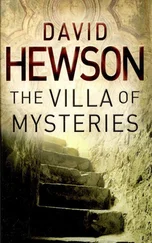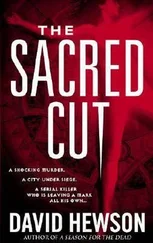“A home ?” Falcone roared.
“He will not go to a home,” Raffaella said quietly. “Please, Leo. Listen to your surgeon. He surely knows what’s best for you.”
“And what the hell am I supposed to do all day?”
“Relax,” Pino suggested mildly. “Read books. Listen to music. Take up a hobby. I recommend painting. It’s a talent found in the most unlikely of men at times. Apart from the physio I don’t expect you to experience much in the way of discomfort. Most men would appreciate the opportunity.”
“Most men!” Falcone spat back at him. He glared at Teresa. “Get Costa and Peroni in here now .”
Pino shook his head. “No. I absolutely forbid it. The stress of work is the last thing you need at this time.”
Falcone glowered at the surgeon. “At least let them send me the files to read. A man’s allowed to read, isn’t he?”
“By all means,” Pino said, smiling. “You can read to your heart’s content.”

THE FOOD TASTED BETTER WHEN LAVAZZI AND MALIPIERO were gone. Gianfranco Randazzo sat one table in from the window, alone in the room, eating and drinking slowly, enjoying the food and the solitude, trying to stretch out the meal for as long as possible. Escaping the monastery made him realise how he was beginning to hate the place. He was becoming sluggish and stupid. One more day. That was all he was prepared to wait. Then he’d get in touch with the right men, in the Questura and in the city, to remind them of a few salient facts. And how it was impolite to have to call in favours by name.
It was now close to two forty-five. He’d worked his way through a larger meal than he’d normally have eaten: antipasti of soft shell crab, calamari and mantis shrimp, porcini risotto, then lamb cutlets with a single contorno of spinach. All accompanied by the best bottle of heavy Barolo on the wine list, almost fifteen degrees proof, a heavy, swirling red of pure alcoholic clout. He felt a little drunk, a little angry too. All of this was undeserved. Aldo Bracci was a lout and a criminal. The thug got what was coming.
And Randazzo’s reward? To be sent into some kind of exile, humiliated when he stepped outside for a brief respite, forced to wear the stupid, itching, sweaty robe of a monk, a disguise that fooled no one, he thought, not by the way the waiter had looked at him, stifling a laugh, when he’d arrived with the two idiots from the Questura, who’d spent the rest of the lunch filling their faces at his expense.
There were scores to be settled after treatment like this. Randazzo ran a few possibilities through his head. He wasn’t going to be content with just a chalet in the mountains anymore. Massiter would make millions out of the Isola degli Arcangeli. He wouldn’t miss a few drops of that spilling over, trickling down to the man who removed the final obstacle to the deal.
He was going over a few more options when the waiter returned with another dish: tiny wild strawberries covered in cream and some kind of booze.
“I didn’t order that,” Randazzo snarled.
“Keep your hair on. It’s a gift!” the waiter remarked, grinning, mocking him. “We don’t get monks in here often. I’m hoping you’ll be bringing along some colleagues in the future. If that’s the right word. We always do good business with the Church. We can give you a little sconto off the bill if you like. How does ten percent sound? Twenty for you?”
“You can start today.” Randazzo glanced at the tables outside. “Make sure it comes off theirs too.”
Then he looked again. They weren’t there. Lavazzi and Malipiero had, without his noticing, finished eating, then somehow wandered off somewhere, maybe to bum a few drinks from some neighbourhood café.
Except.
They were filling their faces for free anyway. It didn’t make sense to Randazzo’s befuddled mind. Sometimes, he thought, there were men who just had to bunk off work, even when there was no good reason. It was bred into their genes. Like a twist in the DNA that, if you could just unravel it, read “lazy bastard, never going to change.”
Randazzo stared at the little piazza and wondered why he didn’t eat here more often. It was Castello, true, but not like the down-at-heel working-class quartiere around the Via Garibaldi where the Questura kept some apartments. This was a good place to eat, a quiet and pretty location, one the tourists found only by accident. Classy. It deserved to be popular. The last time he looked, every table outside had been occupied. Now there was just a single party left outdoors. Three men in blue shirts, sunglasses, slicked-back hair, well-ironed slacks, sat at the opposite end of the terrace to the table the two cops had occupied. Randazzo could understand why everyone else had left. It was hot. It was getting late.
The waiter had gone back to the counter, back to flicking at bread-crumbs and dust with his cloth. Randazzo got to his feet, a little unsteadily, and lifted the bottle of wine. It came up too easily from the table. He glowered at the Barolo, with its fancy yellow label and dark, dark glass. It was empty.
“Coffee,” he mumbled.
The waiter turned and grimaced at him. “What?”
“Coffee,” Randazzo barked angrily. “And grappa. Good grappa. Not the shit you’d normally give out. Big one. I’ll take it outside.”
On another occasion he’d have sat there anyway, looking at the Arsenale gates, thinking about those stolen lions. He liked his history, the good parts anyway. There was a time when entire naval fleets sailed out from the vast military boatyard hidden behind that castellated frontage. Big enough, powerful enough to browbeat the entire eastern Mediterranean into submission, to send emperors fleeing for safety, nations flocking to their treasuries to find some gold that could keep the Venetian pirates at bay.
Piracy and thieving. These were in the native blood. It was fruitless trying to pretend otherwise. He stumbled to the nearest table outside, fell into a chair, waited for the coffee and the drink to arrive, took one gulp of the latter, then poured some cane sugar into his cup and sipped at that.
He was next to the four businessmen, who were staring at him. They could go to hell, Randazzo decided. He’d heard them speaking. Small talk. In a language he half recognised because it was close to native Veneto.
The Croatians were everywhere these days. In the holiday business. In the smuggling rings. It was hard to draw the line between the legitimate ones and the crooks.
Randazzo gave them a sarcastic grin and mumbled, “Salute.”
The biggest raised his glass of beer and said the same back.
Randazzo considered mumbling some low insult under his breath, then thought the better of it.
“What do we call you?” one of the men asked. “Father? Brother? What?”
Randazzo peered at them. In his view the Croatians were scum, mainly. Opportunists who’d just crawled their way to the other side of the Adriatic in the hope of screwing some money out of the first mug they encountered. He gave them one sour glance, then returned to his grappa.
“Maybe he’s supposed to be one of the silent ones,” the nearest suggested. “You know. The kind of monk who never says a thing because he’s too busy contemplating God or something?”
The weasel-like dark-eyed creature by his side laughed. “Too busy contemplating his glass, more like. And what’s on his plate. You pay for that, Father, Brother, Sister, Uncle? Or whatever they call you?”
And they never had any respect. That was another thing that bugged him about the Croatians.
Читать дальше













